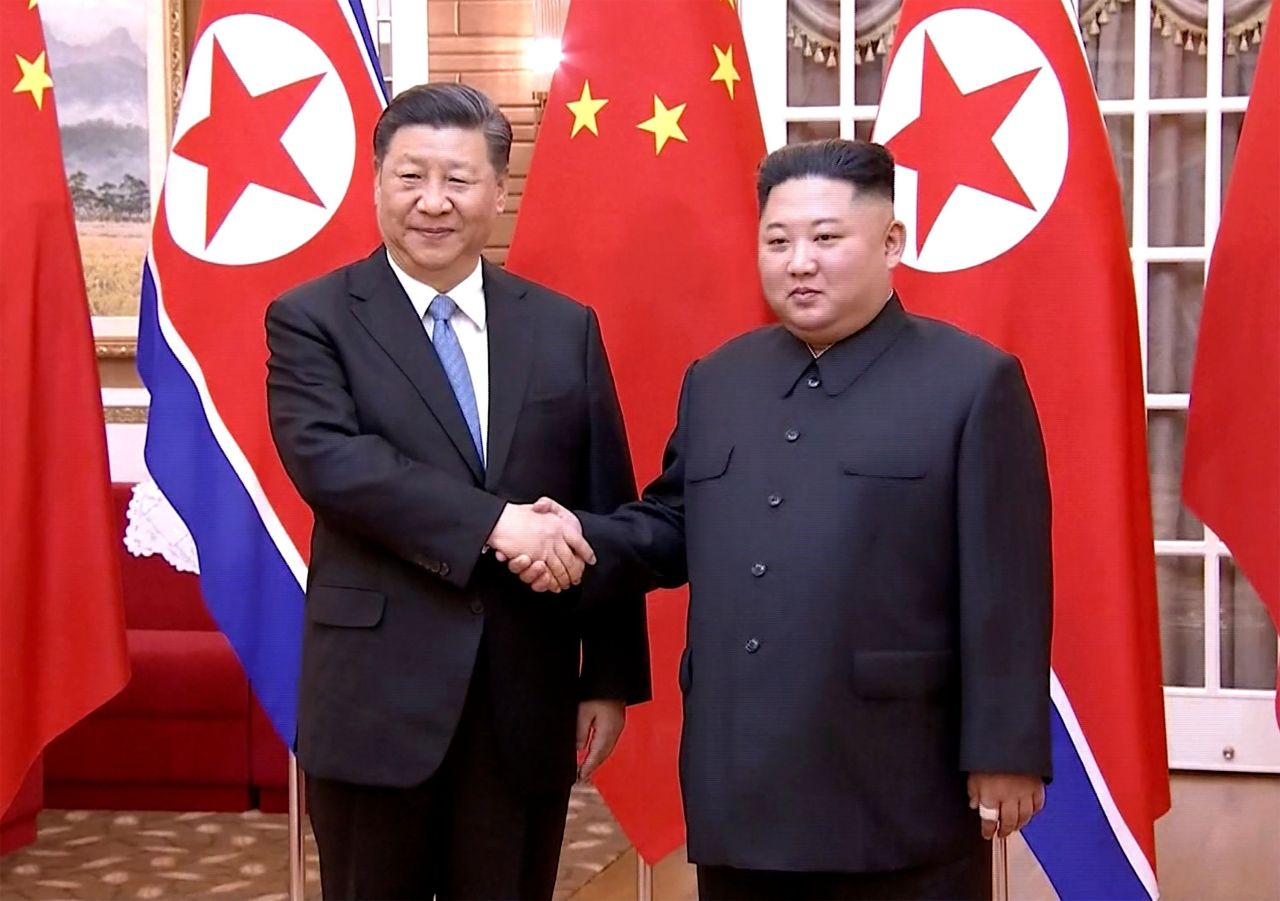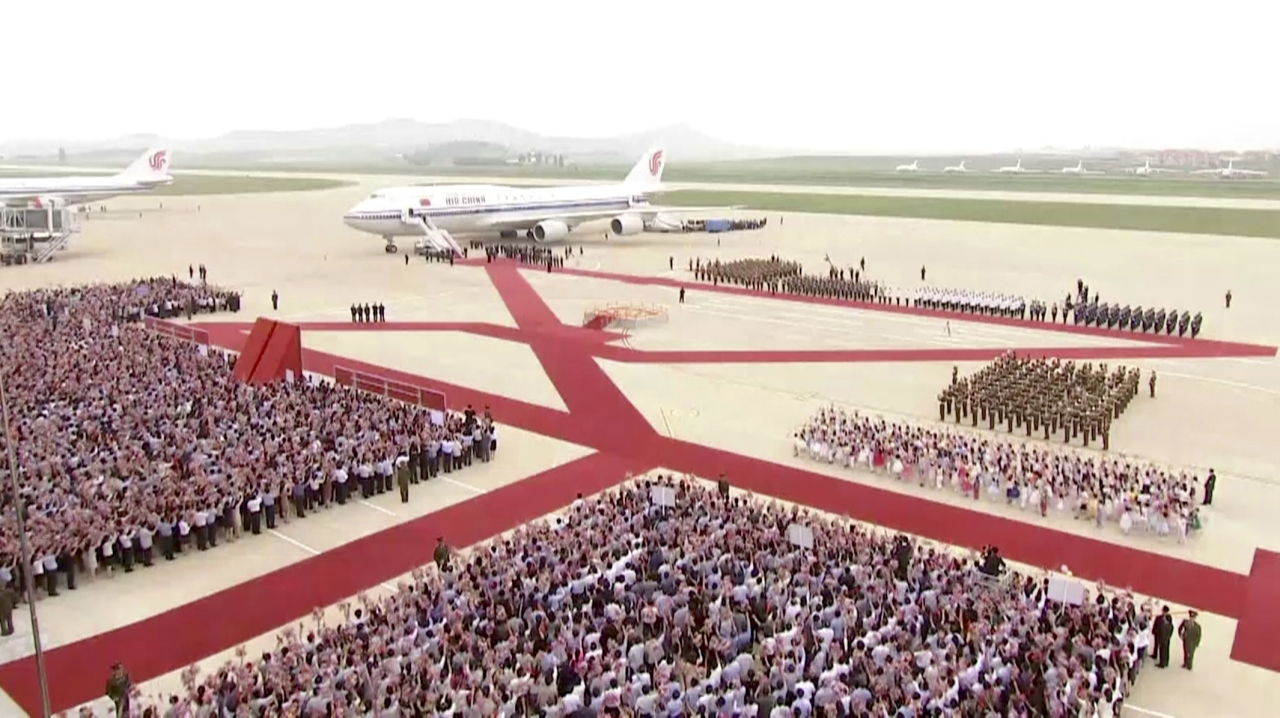June 21, 2019
Xi is currently in Pyongyang for a state visit.
Chinese President Xi Jinping on Thursday began a two-day state visit to North Korea, fanning speculation about changes in the geopolitical dynamics on the Korean Peninsula, as well as denuclearization talks.
Xi touched down in Pyongyang at about 11:40 a.m., beginning his first state visit to the North. He is also the first Chinese leader to make a state visit in 14 years.
Although this is Xi’s first visit to Pyongyang as president, he has held four summits with North Korean leader Kim Jong-un since early last year.
 |
Xi was received by Kim and his wife, Ri Sol-ju, at Pyongyang’s Sunan Airport and the two leaders then held a summit in Pyongyang.
During the meeting with Kim, Xi said China supports the resolution of issues on the Korean Peninsula by political means and is willing to do what it can to address North Korea’s “reasonable security and development concerns.”
Xi said the international community expects the US and North Korea to restart a productive dialogue as the situation on the Korean Peninsula “concerns the peace and stability of the region,” according to state broadcaster CCTV.
“In the past year, issues concerning the peninsula have seen bright prospects for resolution through dialogue, winning the recognition of the international community and inspiring hope,” Xi said, apparently referring to the two summits between Kim and US President Donald Trump in Singapore and Vietnam. Nuclear talks between Washington and Pyongyang have been stalled since the second US-North Korea meeting in Hanoi ended without a deal.
 |
Expressing his frustration with the lack of progress, Kim told Xi that he had not received a meaningful response from the “concerned party” even though Pyongyang had taken “many positive steps” to ease tensions over the past year. By the concerned party, Kim was apparently referring to the US.
Kim said North Korea would “like to remain patient, but hopes the concerned party will meet face to face with North Korea to explore ways to resolve tensions and produce results.”
“(The two sides) exchanged views on the interests of the two leaders, the two (communist) parties and important matters regarding bilateral relations and the future,” Chinese Foreign Ministry spokesperson Lu Kang said at a briefing in Beijing.
According to Chinese media reports, Xi and Kim were scheduled to attend a welcoming dinner and a mass gymnastics performance after the summit.
With less than two weeks left until the G-20 summit in Osaka, Japan, where Xi is set to meet with US President Donald Trump and South Korean President Moon Jae-in, the visit has raised speculation about China’s role in North Korean issues.
Such speculation was heightened Wednesday when the North’s official newspaper, the Rodong Sinmun, carried an op-ed piece by Xi.
In the article, Xi highlighted China-North Korea relations and stated that Beijing would work with Pyongyang and other concerned parties to achieve progress on issues affecting the peninsula.
 |
In Seoul, meanwhile, Chung Eui-yong, director of the National Security Office, presided over a meeting there. According to Cheong Wa Dae, members of the national security council discussed Xi’s visit to the North and the prospects for resumption of US-North Korea talks.
Xi’s visit to the North has been interpreted by some experts, including former Unification Minister Jeong Se-hyun, as representing a critical crossroads for Korean Peninsula issues.
At a forum at the National Assembly on Thursday, Jeong suggested that Xi’s Pyongyang trip illuminates the possibility that four-way negotiations — involving the two Koreas, China and the US — might be on the horizon to determine the future of the Korean Peninsula.
Other experts, however, say the significance of Xi’s visit is largely symbolic.
“Under the current circumstances, I think that China will try to avoid giving the impression that it will exert influence on US-North Korea negotiations by siding with North Korea,” said Cha Du-hyeogn, a visiting research fellow at the Asan Institute for Policy Studies.
Citing Washington’s past criticism of Beijing about its role in North Korean issues, Cha went on to say that Beijing would not want to further escalate US-China tensions.
“I think that (Xi) may highlight traditional China-North Korea relations, or voice support for the North’s position on the denuclearization issue. But steps that would change the situation, such as (China offering) practical measures that offset the effects of sanctions, are unlikely.”
According to Kim Hyun-wook, a professor at the Korea National Diplomatic Academy, Beijing’s designs for China-US tensions and China’s domestic politics will determine Xi’s position on North Korea.
He also raised the possibility that Xi could use North Korea to escalate tensions with Washington, but that the more likely possibility is Xi using North Korea as a bargaining chip in US-China relations.
“(China) could increase its influence and participation in Korean Peninsula issues, and change the situation from that of confrontation to that of dialogue. And lead North Korea (to the negotiation table) and use that as a card in dealing with the US at the G-20 summit,” he said.
However, he said the North is unlikely to be persuaded to take the “big deal” the US wants, a necessary change in Pyongyang’s position for the deal to work.
“The possibility that the North will engage in dialogue (with the US) as a result of Xi’s visit is low. In the end, what will be left is China gaining greater influence on North Korean and Korean Peninsula issues.”
For the North, Xi’s visit shows the possibility of using China as a mediator in dealing with the US should China decide to take a more direct hand in the denuclearization process, he said.
“The North has gained the card of using China as a mediator. Xi won’t simply ask North Korea to change its position, but will also ask the same of the US,” he said.


